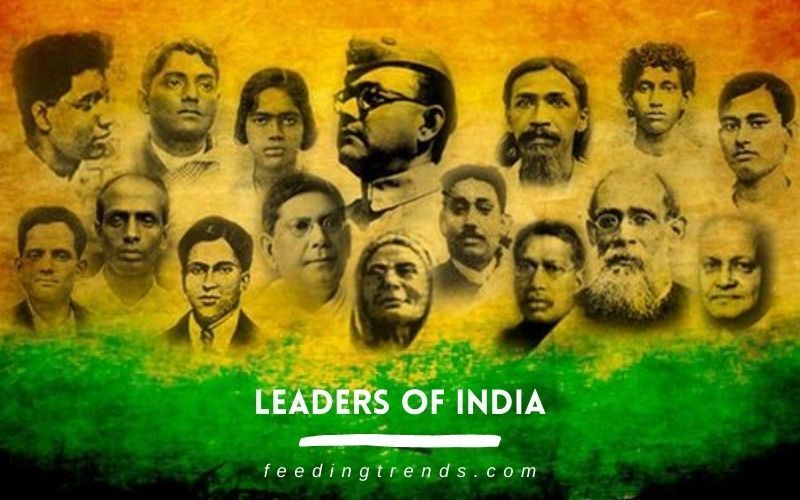
25 Leaders Of India Who Can't Be Forgotten Ever By Any Indian
Politics is the set of activities that are related to making decisions in groups, or other sorts of power relations between individuals, like the distribution of resources or status. The branch of science that studies politics and government is mentioned as politics.
A variety of methods are deployed in politics, which include promoting one's politics among people, negotiation with other political subjects, making laws, and exercising force, including warfare against adversaries.
Politics is exercised on an honest range of social levels, from clans and tribes of traditional societies, through modern local governments, companies, and institutions up to sovereign states, to the international level.
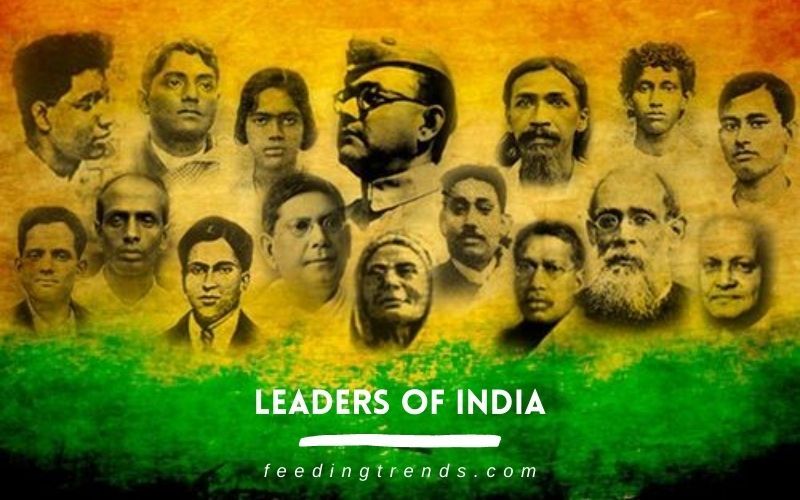
In modern nation-states, people often form political parties to represent their ideas. Members of a celebration often comply with taking an equivalent position on many issues and comply with support and equivalent changes to law and therefore the same leaders. An election is usually a contest between different parties.
Independence Day is widely known annually on 15 August as a legal holiday in India commemorating the nation's independence from the UK on 15 August 1947, the day when the provisions of the 1947 Indian Independence Act, which transferred legislative sovereignty to the Indian Constituent Assembly, came into effect. India attained independence following the Independence Movement noted for largely nonviolent resistance and direct action.
Independence coincided with the partition of India, during which British India was divided along religious lines into the Dominions of India and Pakistan; the partition was amid violent riots and mass casualties, and thus the displacement of nearly 15 million people because of religious violence. On 15 August 1947, the first Prime Minister of India, Nehru raised the Indian ensign above the Lahori Gate of the Red Fort in Delhi.
On each subsequent Independence Day, the incumbent Prime Minister customarily raises the flag and provides an address to the state. Independence Day is observed throughout India with flag-hoisting ceremonies, parades, and cultural events.
Freedom fighters were people that sacrificed their lives selflessly for the liberty of their country. Every country has its justifiable share of freedom fighters. People search for them in terms of patriotism and love for one’s country.
They are considered the epitome of patriotic people. Freedom fighters made sacrifices that one cannot even imagine doing for his or her loved ones, leaving the country. The amount of pain, hardships, and opposition they have endured cannot be put into words. The generations after them will always be indebted to them for his or her selfless sacrifices and diligence.
Many of those freedom fighters are long forgotten but there also are memorials in India that are dedicated to such freedom fighters. India Gate in Delhi is one such memorial that was constructed to pay tribute to many such insurgents who laid their lives for our future. Some of the leaders of India are:-
1. Bhagat Singh
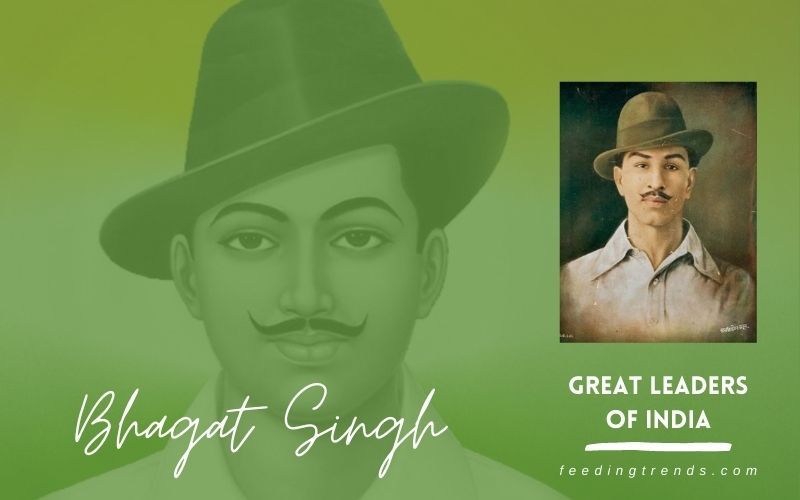
Bhagat Singh was an Indian socialist revolutionary whose two acts of dramatic violence against the British in India and execution at age 23 made him a folk hero of the Indian independence movement. He was born on 27 September 1907.
Bhagat Singh is going to be etched within the minds of Indians forever and ever. As a young boy, he was deeply affected when he witnessed the Jallianwala Massacre and he joined the struggle for freedom then. He became the inspiration of thousands of youth and even today, he's the idol of many people. Bhagat Singh certainly reinforced the dream of getting an independent nation.
Bhagat Singh became a well-liked folk hero after his death. Jawaharlal Nehru wrote about him: "Bhagat Singh didn't become popular due to his act of terrorism but because he appeared to vindicate, for the instant, the honor of Lala Lajpat Rai, and thru him of the state. He became a symbol; the act was forgotten, the symbol remained, and within a couple of months each town and village of the Punjab, and to a lesser extent in the rest of northern India, resounded with his name."
In still later years, Singh, an atheist and socialist in adulthood, won admirers in India from among a political spectrum that included both communists and right-wing Hindu nationalists.
Although many of Singh's associates, also as many Indian anti-colonial revolutionaries, were also involved in daring acts and were either executed or died violent deaths, few came to be lionized in popular art and literature to an equivalent extent as Singh. He is one of the simplest leaders of India.
2. Subhash Chandra Bose
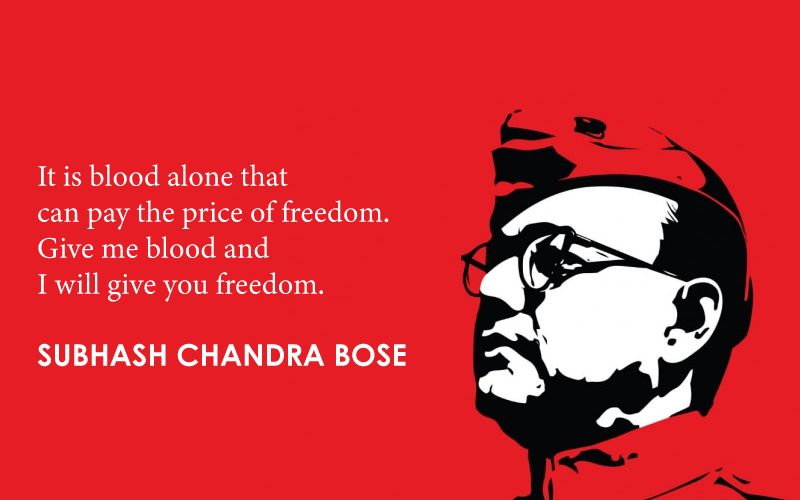
Subhas Chandra Bose was an Indian nationalist whose defiant patriotism made him a hero in India, but whose attempts during war II to rid India of British rule with the help of the Third Reich and Imperial Japan left a troubled legacy. Netaji Subhash Chandra Bose, who spearheaded the Azad Hind Army to hold out armed struggle against the British Army. He was born in Odisha in 1897 and died in 1945.
It is known that he died during a plane crash but there are conspiracy theories around it as his body was never recovered. His Azad Hind Army was one of the greatest threats for the Britishers. The Jallianwala Bagh Massacre potentially shook him and made his return to India from England in 1921. He joined the Indian National Congress and was a member of the direct action movement.
Since he wasn’t content with the Non-Violence method of freedom as promoted by Gandhi Ji, he went to Germany for help and eventually formed Indian National Army (INA) and Azad Hind Government. His famous dialogues are “Freedom isn't given, it's taken”, “Give me blood, I’ll give you freedom”. He is one of the simplest leaders of India.
3. Mohandas Karamchand Gandhi
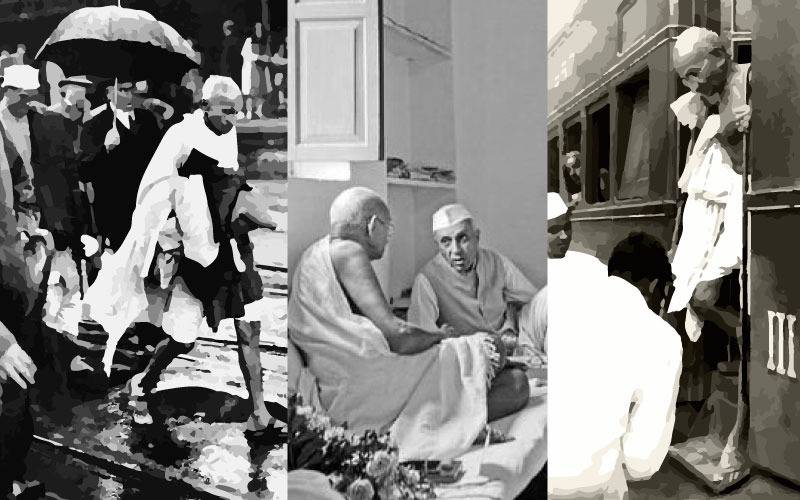
Mohandas Karamchand Gandhi was born on 2 October 1869 and died on 30 January 1948, venerated because the Mahatma, was an Indian lawyer, anti-colonial nationalist, and political ethicist who employed nonviolent resistance to steering the successful campaign for India's independence from British rule and successively inspired movements for civil rights and freedom across the planet.
Gandhi adopted the utilization of an Indian loincloth (short dhoti) and a shawl (in the winter) woven with yarn hand-spun on a standard Indian spinning machine (charkha) as a sign of identification with India's rural poor. He also began to measure modestly during a self-sufficient residential community, ate simple vegetarian food, and undertook long fasts as a way of self-purification and political protest.
In 1915, he returned to India from Africa. He set about organizing peasants, farmers, and concrete laborers to protest against excessive land tax and discrimination. Assuming leadership of the Indian National Congress in 1921, Gandhi led nationwide campaigns for alleviating poverty, expanding women's rights, building religious and ethnic amity, ending untouchability, and especially for achieving swaraj or self-rule. He studied law in London and visited South Africa for the practice where racism towards some Indians inspired him to fight for human rights.
Later, after watching the status of India ruled by Englishmen, Gandhi fiercely joined the liberty fight. He took “Dandi March” on his barefoot to alleviate the tax on salt and led several non-violence movements against Britishers in efforts for freedom. He is one of the simplest leaders of India.
4. Vallabhbhai Patel
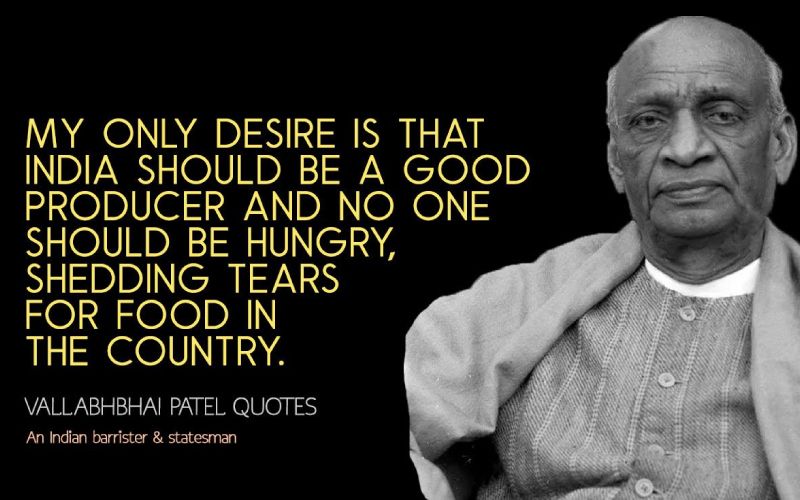
Vallabhbhai Jhaverbhai Patel (31 October 1875 – 15 December 1950, endeared as Sardar Patel, was an Indian statesman. He served as the First Deputy Prime Minister of India.
He was an Indian barrister and a senior leader of the Indian National Congress who played a variety one roles within the country's struggle for independence and guided its integration into a united, independent nation. The Statue of Unity, the world's tallest statue, was dedicated to him on 31 October 2018 which is approximately 182 meters in height.
He earned the title ‘Sardar’ after his heroic contribution to Bardoli Satyagraha. Due to his brave endeavors, he eventually began to be considered ‘the iron man of India’. He led the task of forging a united India, successfully integrating into the newly independent nation those British colonial provinces that formed the Dominion of India.
He is also remembered as the "patron saint of India's civil servants ' for having established the fashionable all-India services system. He is also called the "Unifier of India''. He is one of the simplest leaders of India.
5. Rajendra Prasad
Rajendra Prasad (3 December 1884 – 28 February 1963) was an Indian independence activist, lawyer, scholar, and subsequently, the first President of India, in office from 1950 to 1962.
He was an Indian politician and lawyer by training. Prasad joined the Indian National Congress during the Indian Independence Movement and became a significant leader from the region of Bihar. A supporter of Gandhi, Prasad was imprisoned by British authorities during the Salt Satyagraha of 1931 and therefore the Quit India movement of 1942. After the constituent assembly 1946 elections, Prasad served as Minister of Food and Agriculture within the central government.
Upon independence in 1947, Prasad was elected as President of the Constituent Assembly of India, which prepared the Constitution of India and served as its provisional parliament. Prasad played a significant role in forming the Bihari Students Conference in 1906 and served as the president of the Constituent Assembly that drafted the Constitution of India. He is one of the simplest leaders of India.
6. Jawaharlal Nehru
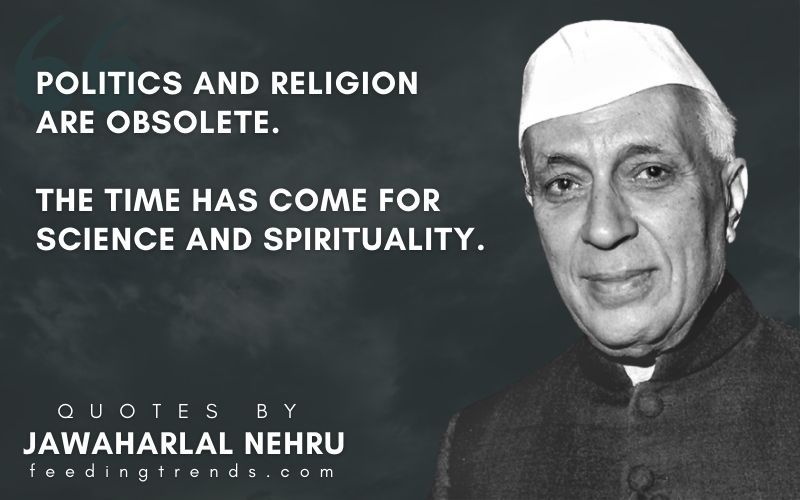
Jawaharlal Nehru was born on 14 November 1889 and died on 27 May 1964, was an Indian independence activist and later the first prime minister of India. Considered one among the simplest statesmen of India and therefore the 20th century, he was a central figure in Indian politics both before and after independence.
He emerged as an eminent leader of the Indian independence movement, serving India as prime minister from its establishment in 1947 as an independent nation until he died in 1964. He was also referred to as Pandit Nehru due to his roots within the Kashmiri Pandit community.
Since he adored children, he was called Chacha Nehru and his birthday is widely known as Children’s day. His passion for India’s freedom was the influence of Mahatma Gandhi’s efforts to alleviate India from Britishers. As Prime Minister, he began to understand his vision of India. The Constitution of India was enacted in 1950, after which he began an ambitious program of economic, social, and political reforms. Chiefly, he oversaw India's transition from a colony to a republic, while nurturing a plural, multi-party system.
In policy, he took a number one role within the Non-Aligned Movement while projecting India as a regional hegemon in South Asia. Under Nehru's leadership, the Congress emerged as a catch-all party, dominating national and state-level politics and winning consecutive elections in 1951,1957, and 1962.
He remained fashionable to the people of India despite political troubles in his final years and failure of leadership during the 1962 Sino-Indian War. He is one of the simplest leaders of India.
7. Lal Bahadur Shastri
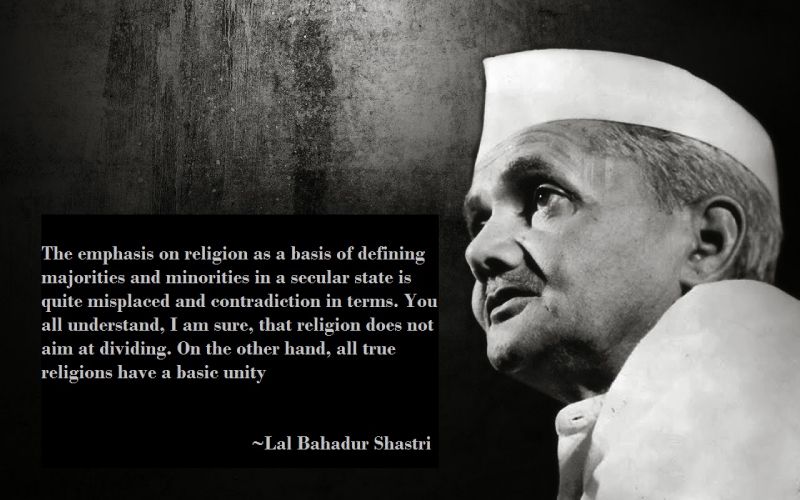
Lal Bahadur Shastri (2 October 1904 – 11 January 1966) was an Indian statesman who served as the second Prime Minister of India. He promoted the White Revolution – a national campaign to increase the assembly and supply of milk – by supporting the Amul milk co-operative of Anand, Gujarat, and creating the National Dairy Development Board.
Underlining the necessity to spice up India's food production, Shastri also promoted the revolution in India in 1965. This led to an increase in food grain production, especially in Punjab, Haryana, and Uttar Pradesh. He studied in East Central Railway Inter college and Harish Chandra high school, which he left to hitchhike the non-cooperation movement. He worked for the betterment of the Harijans at Muzaffarpur and dropped his caste-derived surname of "Srivastava". Shastri's thoughts were influenced by reading about Swami Vivekananda, Gandhi, and Annie Besant.
Deeply impressed and influenced by Gandhi, he joined the Indian independence movement within the 1920s. He served as the president of Servants of the People Society (Lok Sevak Mandal), founded by Lala Lajpat Rai, and held prominent positions in the Indian National Congress. Following independence in 1947, he joined the Indian government. He led the country during the Indo-Pakistan War of 1965. His slogan "Jai Jawan, Jai Kisan" ("Hail to the soldier; Hail to the farmer") became very fashionable during the war.
The war formally ended with the Tashkent Agreement on 10 January 1966; he died the subsequent day, still in Tashkent, with the explanation for his death in dispute; it was reported to be asystole, but his family wasn't satisfied with the proffered reason. He was posthumously awarded the Bharat Ratna. He is one of the simplest leaders of India.
8. Bal Gangadhar Tilak
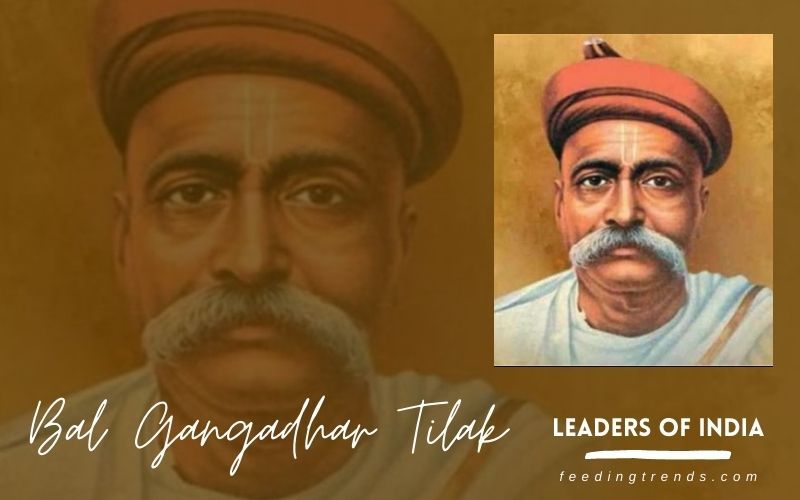
Bal Gangadhar Tilak (23 July 1856 – 1 August 1920), born as Keshav Gangadhar Tilak, was an Indian nationalist, teacher, and independence activist. He was one-third of the Lal Bal Pal triumvirate. Tilak was the primary leader of the Indian independence movement. The British colonial authorities called him "The father of the Indian unrest."
He was also conferred with the title of "Lokmanya", which suggests "accepted by the people (as their leader)". Mahatma Gandhi called him "The Maker of recent India". Tilak was one of the primary and strongest advocates of Swaraj ("self-rule") and a robust radical in Indian consciousness. He is known for his quote in Marathi: "Swarajya is my birthright which I shall have!".
He formed an in-depth alliance with many Indian National Congress leaders including Bipin Chandra Pal, Lala Lajpat Rai, Aurobindo Ghose, V. O. Chidambaram Pillai, and Muhammad Ali Jinnah. Tilak had an extended political career agitating for Indian autonomy from British colonial rule. Before Gandhi, he was the foremost widely known Indian politician.
Unlike his fellow Maharashtrian contemporary, Gokhale, Tilak was considered a radical Nationalist but a Social conservative. He was imprisoned on a variety of occasions that included an extended stint at Mandalay. He is one of the simplest leaders of India.
9. Gopal Krishna Gokhale
Gopal Krishna Gokhale (9 May 1866 – 19 February 1915) was an Indian liberal politician and a social reformer during the Indian Independence Movement. Gokhale was a senior leader of the Indian National Congress and therefore the founding father of the Servants of India Society.
Through the Society also because of the Congress and other legislative bodies he served in, Gokhale campaigned for Indian self-rule and social reforms. He was the leader of the moderate faction of the Congress party that advocated reforms by working with existing government institutions. Gopal Krishna Gokhale acted as a mentor to Mohammed Ali Jinnah and Gandhi.
He had an excellent influence on the social works of Justice Mahadev Govind Ranade in his life. He was named because the ‛Protege Son’ i.e., Manas Putra of Justice Mahadev Govind Ranade. He is one of the simplest leaders of India.
10. Lala Lajpat Rai
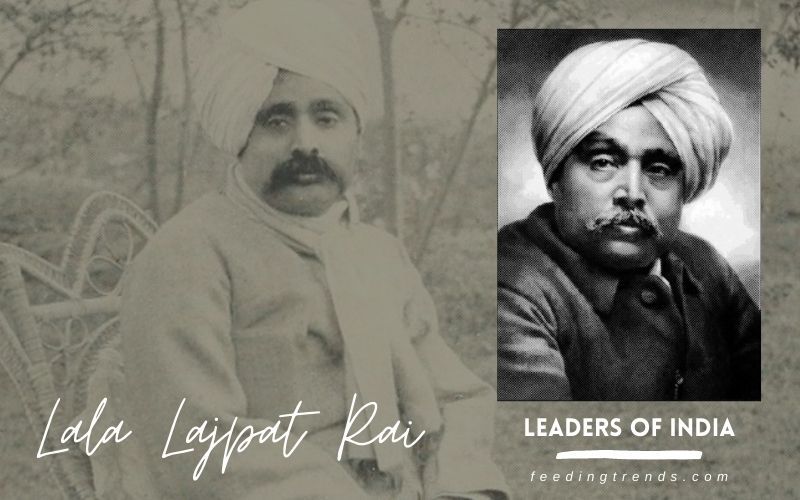
Lala Lajpat Rai (28 January 1865 -17 November 1928) was an Indian independence activist. He played a pivotal role in the Indian Independence movement. He was popularly known as Punjab Kesari. He was one among the three members of the Lal Bal Pal triumvirate.
He was also related to the activities of Punjab commercial bank and Lakshmi insurance firm in their early stages of death in 1894. He died a couple of weeks after sustaining severe injuries during a baton charge by police when he led peaceful civil disobedience against the all-British Simon Commission, a commission constituted by the UK for Indian constitutional reform.
After joining the Indian National Congress and participating in political agitation in Punjab, Lala Lajpat Rai was deported to Mandalay, but there was insufficient evidence to hold him for subversion. He was elected President of the Indian National Congress within the Calcutta session of 1920. In 1921, he founded Servants of the People Society, a non-profit welfare organization, in Lahore.
According to him, Hindu society must fight its own battle with class structure, the position of girls, and untouchability. Vedas were a crucial part of the Hindu religion but the lower caste wasn't allowed to read them. Lala Lajpat Rai approved that the lower caste should be allowed to read them and recite the mantras. He is one of the simplest leaders of India.
11. Dr. B R Ambedkar
Bhimrao Ramji Ambedkar (14 April 1891 – 6 December 1956), venerated as Babasaheb, was an Indian jurist, economist, politician, and social reformer, who inspired the Dalit Buddhist movement and campaigned against social discrimination towards the untouchables (Dalits).
He was British India's Minister of Labour in Viceroy's council, Chairman of the Constituent Drafting committee, independent India's first Minister of Law and Justice, and thought of as the chief architect of the Constitution of India.
Ambedkar was a prolific student, earning doctorates in economics from both Columbia University and thus the London School of Economics, gaining a reputation as a scholar for his research in law, economics, and political science.
In his early career, he was an economist, professor, and lawyer. His later life was marked by his political activities; he became involved in campaigning and negotiations for India's independence, publishing journals, advocating political rights and social freedom for Dalits, and contributing significantly to the establishment of the state of India. In 1990, the Bharat Ratna, India's highest civilian award, was posthumously conferred upon Ambedkar.
Ambedkar's legacy includes numerous memorials and depictions in popular culture. He is one of the simplest leaders of India.
12. Rani Lakshmi Bai
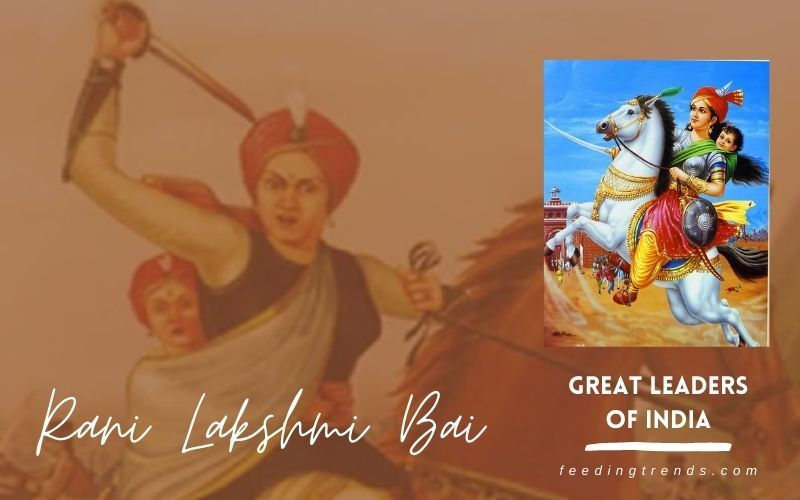
Lakshmi Bai, the Rani of Jhansi (19 November 1828 - 18 June 1858), was the Maharani consort of the Maratha princely state of Jhansi from 1843 to 1853 due to the wife of Maharaja Gangadhar Rao.
She was one of the leading figures of the Indian Rebellion of 1857 and has become a logo of resistance to British Raj for Indian nationalists. She died within the Rebellion, wounded and killed during a battle. She has educated reception and was taught to read and write, and was more independent in her childhood than others of her age; her studies included shooting, horsemanship, fencing, and mallakhamb together with her childhood friends Nana Sahib and Tatya Tope.
Rani Lakshmibai contrasted many of the patriarchal cultural expectations for girls in India's society at present. Rani Lakshmibai was familiar with riding on horseback amid escorts between the palace and therefore the temple, although sometimes she was carried during a palanquin. Her horses included Sarangi, Pavan, and Baadal; according to historians, she rode Baadal when escaping from the fort in 1858.
Her palace, the Rani Mahal, has now been converted into a museum. It houses a set of archaeological remains of the amount between the 9th and 12th centuries AD. She is one of the best leaders of India.
13. Sarojini Naidu
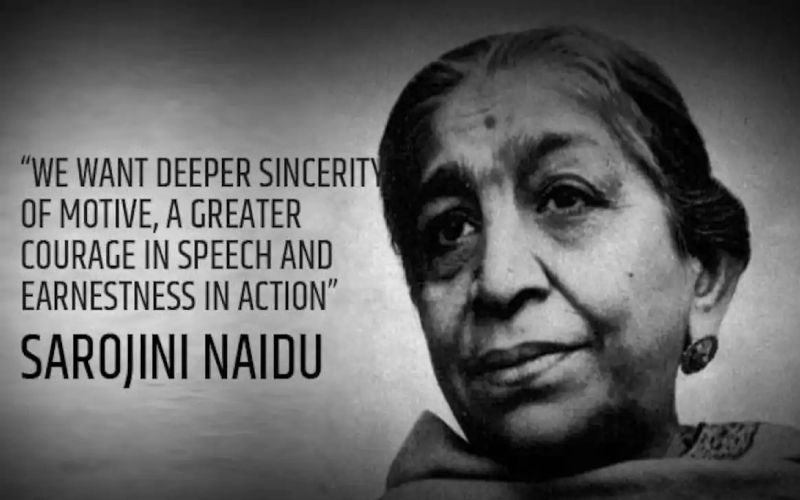
Sarojini Naidu (13 February 1879 – 2 March 1949) was an Indian political activist and poet. A proponent of civil rights, women's emancipation, and anti-imperialistic ideas, she was a crucial figure in India's struggle for independence from colonial rule.
Naidu's work as a poet earned her the sobriquet 'the Nightingale of India', or 'Bharat Kokila' by Gandhi thanks to the color, imagery, and lyrical quality of her poetry. Following her time in England, where she worked as a suffragist, she was drawn to the Indian National Congress' movement for India's independence from British rule.
She became a member of the Indian nationalist movement and has become a lover of Gandhi and his idea of swaraj. She was appointed as the President of the Indian National Congress in 1925 and later became the Governor of the United Provinces in 1947, becoming the primary woman to hold the office of Governor within the Dominion of India.
Naidu's poetry includes both children's poems and lots of different poems written on more serious themes including patriotism, romance, and tragedy. Published in 1912, "In the Bazaars of Hyderabad" remains one of her hottest poems. She died of cardiac arrest. She is one of the best leaders of India.
14. Chandrashekhar Azad

Chandrashekhar Azad was another pioneer in the Indian freedom struggle. He was born in Bhavra in 1906 and acted as a driver, instilling courage and confidence within the young Indians to achieve freedom by standing against British oppression. He died in 1931, giving up his life to attaining freedom for the country. It is known that the Britishers were frightened of him due to his strength and his determination. He was closely associated with Bhagat Singh.
During the encounter, it's known that he shot himself with the last bullet in his colt pistol which remains on display in Allahabad Museum. He was an Indian revolutionary who reorganized the Hindustan Republican Association (HRA) under its new name of the Hindustan Socialist Republican Association (HSRA) after the death of its founder, Ram Prasad Bismil, and three other prominent party leaders, Roshan Singh, Rajendra Nath Lahiri and Ashfaqulla Khan.
He often used the pseudonym "Balraj '' when signing pamphlets issued because of the commander in chief of the HSRA. He is one of the simplest leaders of India.
15. Udham Singh
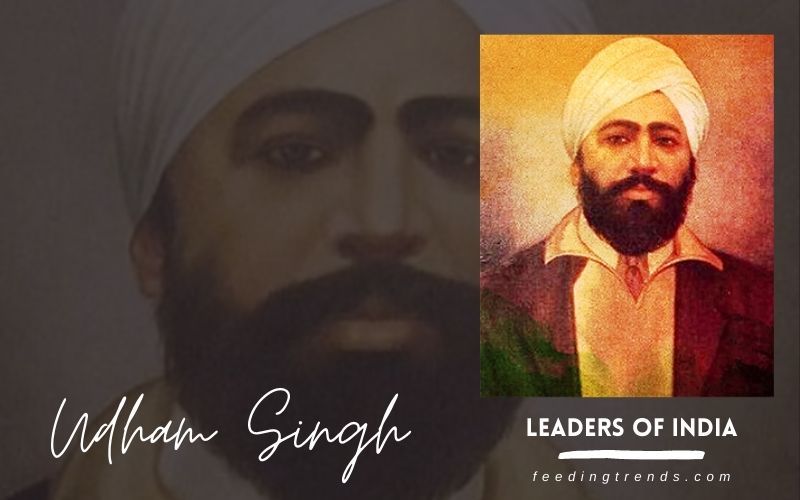
Udham Singh (26 December 1899 – 31 July 1940) was an Indian revolutionary belonging to the Ghadar Party, best known for his assassination in London of Michael O'Dwyer, the previous lieutenant governor of Punjab in India, on 13 March 1940.
The assassination was exhausted revenge for the Jallianwala Bagh massacre in Amritsar in 1919, for that O'Dwyer was responsible. Singh was subsequently tried and convicted of murder and hanged in July 1940. While in custody, he used the name Ram Mohammad Singh Azad, which represents the three major religions of Punjab and his anti-colonial sentiment. Udham Singh may be a well-known figure of the Indian independence movement.
A district (Udham Singh Nagar) of Uttarakhand was named after him to pay homage in October 1995 by the Mayawati government. He is one of the simplest leaders of India.
16. Rabindranath Tagore
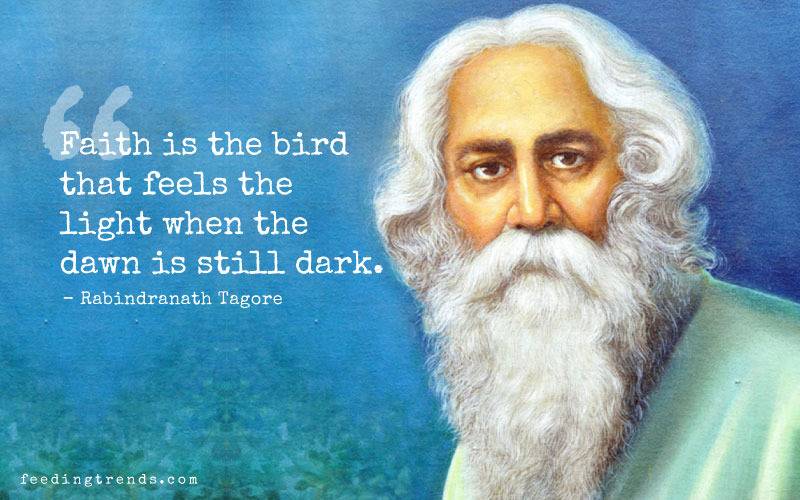
Rabindranath Tagore (7 May 1861 – 7 August 1941) was a Bengali polymath – poet, writer, playwright, composer, philosopher, social reformer, and painter. He reshaped Bengali literature and music also as Indian art with Contextual Modernism within the late 19th and early 20th centuries.
Author of the "profoundly sensitive, fresh and delightful verse" of Gitanjali, he became in 1913 the primary non-European to win the Nobel prize in Literature. Tagore's poetic songs were viewed as spiritual and mercurial; however, his "elegant prose and magical poetry" remain largely unknown outside Bengal. He is sometimes mentioned as "the Bard of Bengal ''. As a humanist, universalist, internationalist, and ardent anti-nationalist, he denounced the British Raj and advocated independence from Britain.
As a lover of the Bengal Renaissance, he advanced a huge cannon that comprised paintings, sketches and doodles, many texts, and a few two thousand songs; his legacy also endures in the institution he founded, Visva-Bharati University. His compositions were chosen by two nations as national anthems: India's "Jana Gana Mana '' and Bangladesh's "Amar Shonar Bangla ''. He is one of the simplest leaders of India.
17. Bipin Chandra Pal
Bipin Chandra Pal (7 November 1858 – 20 May 1932) was an Indian nationalist, writer, orator, social reformer, and Indian independence movement insurgent. He was one-third of the “Lal Bal Pal” triumvirate. Pal was one of the architects of the Swadeshi movement alongside Sri Aurobindo. He also opposed the partition of Bengal by the British colonial government.
Pal is understood as the Father of Revolutionary Thoughts in India and was one of the liberty fighters of India. Pal became a serious leader of the Indian National Congress. At the Madras session of the Indian National Congress held in 1887, Bipin Chandra Pal made a robust plea for repeal of the Arms Act which was discriminatory. His program consisted of Swadeshi, boycott, and national education.
He preached and encouraged the utilization of Swadeshi and thus the boycott of foreign goods to eradicate poverty and unemployment. He wanted to get rid of social evils from the shape and arouse the emotions of nationalism through national criticism. He had no faith in mild protests within the type of non-cooperation with the British colonial government. Sri Aurobindo mentioned him together as the mightiest prophet of nationalism.
Bipin Chandra Pal made efforts to get rid of social and economic ills. He opposed class structure and advocated widow remarriage. He advocated 48 hours of labor week and demanded a hike in wages of workers. He is one of the simplest leaders of India.
18. Matangini Hazra
Matangini Hazra (17 November 1869 – 29 September 1942) was an Indian revolutionary who participated in the Indian independence movement until she was shot dead by British Indian police. She was affectionately referred to as Gandhi Buri, Bengali for Gandhi. In 1905, she became actively curious about the Indian independence movement as a Gandhian.
A notable feature of the liberation struggle in Midnapore was the participation of girls. In 1932, she took part in the direct action movement and was arrested for breaking the Salt Act. She was promptly released but protested for the abolition of the tax.
After being released, she became a lively member of the Indian National Congress and took to spinning her own Khadi. As a neighborhood of the Quit India Movement, members of Congress planned to take over the numerous police stations of Medinipur district and other government offices.
This was to be a step in overthrowing the British government within the district and establishing an independent Indian state. She is one of the best leaders of India.
19. Begum Hazrat Mahal
Begum Hazrat Mahal (1820 – 7 April 1879), also mentioned because the Begum of Awadh was the second wife of Nawab of Awadh Wajid Ali Shah, and therefore the regent of Awadh in 1857–1858.
She is understood for the leading role she had within the rebellion against the British East India Company during the Indian Rebellion of 1857. After her husband had been exiled to Calcutta and thus the Indian Rebellion broke out, she made her son, Prince Birjis Qadr, the Wali (ruler) of Awadh, with herself as regent during his minority.
However, she was forced to abandon this role after a brief reign. She finally found asylum in Nepal. Her role within the rebellion has given her a heroine status. She is one of the best leaders of India.
20. Mangal Pandey
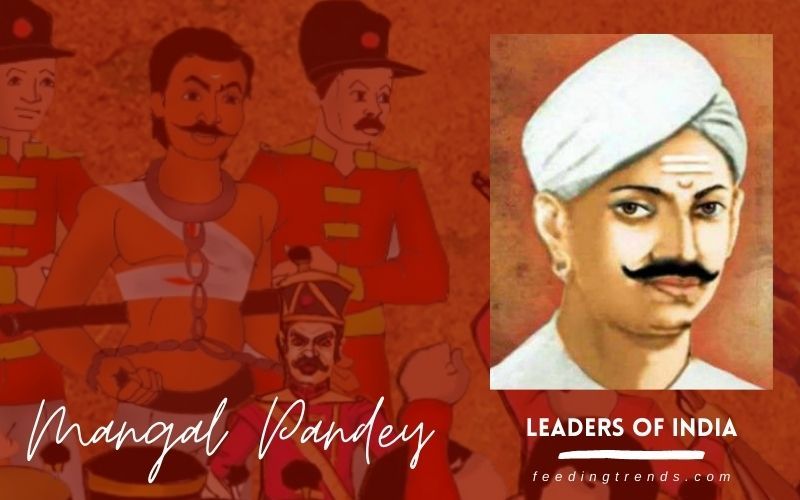
Mangal Pandey was an Indian soldier who played a key part in the events immediately preceding the outbreak of the Indian rebellion of 1857. He was a sepoy (infantryman) within the 34th Bengal Native Infantry (BNI) regiment of the British Malay Archipelago Company. In 1984, the Indian government issued postage to recollect him.
His life and actions have also been portrayed in several cinematic productions. He was a member of the British Army but revolted against them when the soldiers were provided cartridges greased with fat. After an armed mutiny against the military, Pandey was hanged to death in 1857.
This was one of the most important revolutions within the history of India and his death wasn't the top of the story. His death was the start of the story which took 90 years to urge over. He is one of the simplest leaders of India.
21. Bahadur Shah Zafar
Bahadur Shah Zafar (24 October 1775 – 7 November 1862) was the 20th and last Mughal Emperor of India. He was also a famous Urdu Poet. He was a titular Emperor because the Mughal Empire existed in name only and his authority was limited only to the walled city of Delhi (Shahjahanabad).
Following his involvement within the Indian Rebellion of 1857, the British exiled him to Rangoon in British-controlled Burma (now in Myanmar), after convicting him on several charges. Zafar's father, Akbar II, had been imprisoned by the British and he wasn't his father's preferred choice as his successor. One of Akbar Shah's queens, Mumtaz Begum, pressured him to declare her son, Mirza Jahangir, as his successor.
However, The Malay Archipelago Company exiled Jahangir after he attacked their resident, within the Red Fort, paving the way for Zafar to assume the throne. He is one of the simplest leaders of India.
22. Vinoba Bhave
Vinoba Bhave (11 September 1895 – 15 November 1982) was an Indian advocate of nonviolence and human rights. Often called Acharya (Sanskrit for teacher), he's best known for the Bhoodan Movement. He is considered as a National Teacher of India and therefore the spiritual successor of Gandhi. He was an eminent philosopher.
The Gita has also been translated into the Marathi language by him with the name Geetai means mother Geeta. Bhave participated with keen interest within the activities at Gandhi's ashram, like teaching, studying, spinning, and improving the lifetime of the community.
His involvement with Gandhi's constructive programs related to Khadi, village industries, new education (Nai Talim), sanitation and hygiene also kept on increasing. Bhave participated in the nationwide protest periodically conducted against the British and was imprisoned with other nationalists.
Despite these many activities, he wasn't documented to the general public. He gained national prominence when Gandhi chose him due to being the primary participant during a replacement nonviolent campaign in 1940. He is one of the simplest leaders of India.
23. Tara Rani Srivastava

Tara Rani Srivastava was an Indian insurgent, and a part of Mahatma Gandhi's Quit India Movement. She and her husband, Phulendu Babu, lived within the Saran district of Bihar.
On 12 August 1942, called upon by Gandhi, she and her husband organized a march to boost the Flag of India ahead of the Siwan police headquarters, an act that might be seen as "a major defiance." The police, in preventing them from hoisting the flag, lathi-charged the protesters. When they were unable to realize control, the police opened fire. Phulendu Babu was among the shot and wounded.
Despite that, after bandaging Babu's wounds with strips of fabric torn from her sari, Tara Rani continued her march to the police headquarters, where she attempted to hoist the flag; on her return, she discovered that her husband had died of his injuries. On 15 August 1942, a prayer service was held in Chhapra in honor of her husband's sacrifice for the country.
She continued to be a part of the liberation struggle until the Partition of India on 15 August 1947. She remained a neighborhood of the struggle for freedom until the country's independence five years later. She is one of the best leaders of India.
24. Ram Mohan Roy
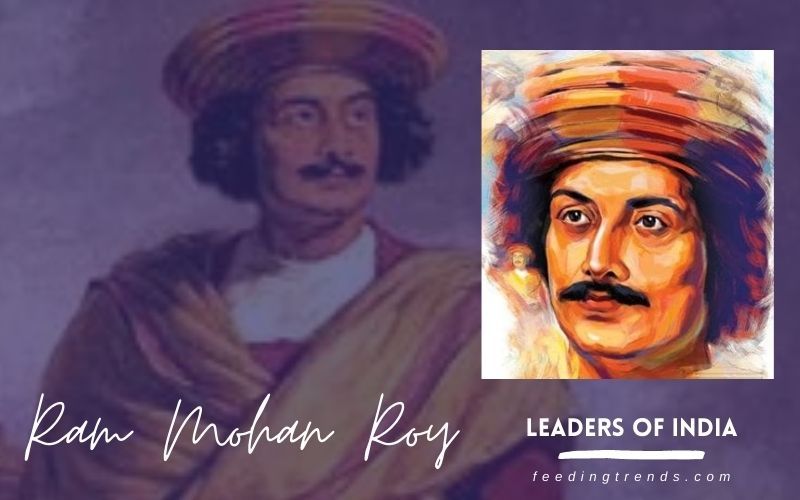
Raja Ram Mohan Roy (22 May 1772 – 27 September 1833) was an Indian reformer who was one of the founders of the Brahmo Sabha, the precursor of the Brahmo Samaj, a social-religious movement within the Indian subcontinent. He was given the title of Raja by Akbar II, the Mughal emperor. His influence was apparent within the fields of politics, public administration, education, and religion.
He was known for his efforts to abolish the practices of sati and child marriage. Roy is taken into account to be the "Father of the Bengal Renaissance" by many historians. Ram Mohan Roy’s experience working with the British government taught him that Hindu traditions were often not credible or respected by western standards and this little question affected his religious reforms. He wanted to legitimize Hindu traditions to his European acquaintances by proving that "superstitious practices which deform the Hindu religion do not have anything to undertake with the pure spirit of its dictates!"
The "superstitious practices", to which Ram Mohan Roy objected, included sati, caste rigidity, polygamy, and child marriages. These practices were often the explanations British officials claimed moral superiority over the Indian nation.
Ram Mohan Roy’s ideas of faith actively sought to make a good and just society by implementing humanitarian practices almost like the Christian ideals professed by the British and thus seeking to legitimize Hinduism within the eyes of the Christian world. He is one of the simplest leaders of India.
25. Ram Prasad Bismil
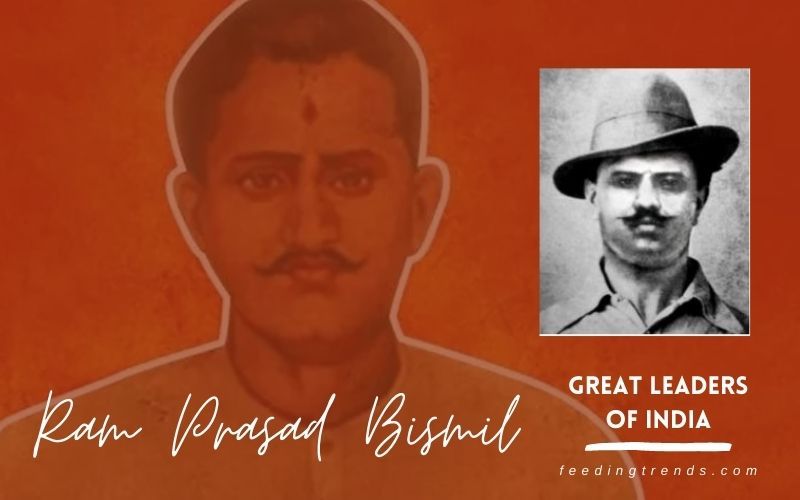
Ram Prasad Bismil (11 June 1897 — 19 December 1927) was an Indian revolutionary who participated in the Mainpuri Conspiracy of 1918, and therefore the Kakori Conspiracy of 1925 and fought against British rule in India. Bismil was hanged by the British for his revolutionary activities.
As well as being an insurgent, he was a patriotic poet and wrote in Hindi and Urdu using the pen names Ram, Agyat, and Bismil. He became fashionable with the surname "Bismil '' only. He was related to Arya Samaj where he got inspiration from Satyarth Prakash, a book written by Swami Dayanand Saraswati. He also had a confidential reference to Lala Har Dayal through his guru Swami Somdev, a preacher of Arya Samaj.
Bismil was one of the founding members of the revolutionary organization Hindustan Republican Association. Bhagat Singh praised him as an excellent poet-writer of Urdu and Hindi, who had also translated the books, Catherine, from English and Bolsheviks Ki Kartoot from Bengali. On 28 January 1918, Bismil published a pamphlet titled Deshvasiyon Ke Nam Sandesh (A Message to Countrymen), which he distributed alongside his poem Mainpuri Ki Pratigya (Vow of Mainpuri).
To collect funds for the party, looting was undertaken on three occasions in 1918. Police looked for them in and around Mainpuri while they were selling books prescribed by the U.P. Government in the Delhi Congress of 1918. When police found them, Bismil absconded with the books unsold. When he was planning another looting between Delhi and Agra, a police team arrived and firing started from both edges. Bismil jumped into the Yamuna and swam underwater.
The police and his companions thought that he had died within the encounter. Dixit was arrested alongside his other companions and was kept in Agra fort. From here, he fled to Delhi and lived in a doggo. A criminal case was filed against them. The incident is understood because of the "Mainpuri Conspiracy''. He is one of the simplest leaders of India.
‘Free India’ was a dream of all Indians under British rule. Indian freedom fighters with their true spirit and undaunted courage had faced various tortures, exploitations, and hardships to earn freedom for us. We must respect this freedom and our country.
Mahatma Gandhi is the father of our nation who stood strong and achieved freedom by showing the direction for several other freedom fighters and therefore the people of the country to take active participation in the freedom movement. It has been almost seven decades since India gained independence and therefore the country has progressed at a faster pace.
The nation has been growing economically and socially and is heading towards development. If these freedom fighters had not contributed to the freedom struggle, the present situation of the country would be different. India, the democratic republic, won't have headed for fulfillment.
We are independent and free today only due to the efforts and sacrifices made by our country's freedom fighters. So, these are some of the greatest leaders of India.
Read more:
- 35 Great Leaders Of The World Who Are Real Inspiration
- 30 Great Leaders Of India Whose Contribution Can't Be Explained In Words
- 20 Women Leaders Of India Setting An Example For The Upcoming Gen
- 45 Abdul Kalam Quotes Which Will Inspire You To Achieve Success
- 35 Indian Motivational Speakers For Self Confidence & Positive Thinking
Appreciate the creator